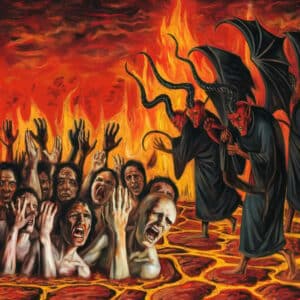
 Predestination is a notion that certain life events and outcomes are predetermined by a higher power, like God’s will. This implies that a person’s fate has already been decided and can thus not be altered.
Predestination is a notion that certain life events and outcomes are predetermined by a higher power, like God’s will. This implies that a person’s fate has already been decided and can thus not be altered.
As opposed to this belief, free will posits that individuals possess the liberty to select their own paths, and that their decisions and actions can have effects on the ultimate outcome.
Specific faiths, for instance Calvinism in Christianity, strongly promote the concept of predestination whilst others, like Arminianism, adhere to the power of individual choice. It is worthy of consideration that multiple belief systems can hold assorted outlooks on this topic, and one denomination may possess a range of opinions.
Predestination vs Free Will
It is noteworthy to point out that predestination and free will are not incompatible, as some ideologies incorporate elements of both. Believing in predestination does not indicate the absence of free will, nor does free will preclude the notion of predestination. Several spiritual doctrines value both concepts and their respective ratio can be highly disputed among different circles.
Predestination
The belief that God controls life’s events is widespread in several religions. These beliefs stem from the notion that God is all-knowing and omnipotent, with everything occurring according to His divine plan.
Examples of Religious Teachings That Support Predestination
In the monotheistic faith of Christianity, Calvinism is a theological school of thought that focuses on the concept of God’s absolute rule and the doctrine of predestination. According to this belief, God has predetermined who will be saved and damned; this decision is not based on someone’s own behavior or free will.
Islam also holds fate as an integral part of its divine plan for the universe and for humans alike. Muslims accept that all scenarios, even those generated by humans, are ordained by God, being rooted in His power and wisdom.
Counter-examples That Challenge the Idea of Predestination
The concept of repentance in Christianity and the idea of free will in Islam both focus on how individuals can shape their destiny. In Christianity, repentance is the act of turning away from sin towards God.
This suggests that people have the capacity to choose and change their life paths. Islam believes that humans can choose their own fates.
Free Will
Individuals have the capacity to choose their own paths and bear the consequences of those choices. This concept of autonomy and self-governance is based on the notion that humans think, reason, and make decisions autonomously. Free will implies that individuals possess the ability to exercise power over their destiny, taking responsibility for their actions. In other words, free will affords people the opportunity to direct their lives according to their own agency.
Examples of Religious Teachings That Support Free Will
In Christianity, Arminianism stresses the sovereignty of human will. Rather than predetermining salvation or damnation, God has granted humans with the capacity to decide their own destiny through the exercising of free choice.
Comparably, Buddhism emphasizes the autonomy of the individual in controlling their fate, believing that by taking control of their actions, one can rise above suffering and attain enlightenment.
Counter-examples That Challenge the Idea of Free Will
Many religions argue predestination and karma. Jewish predestination holds that God predestines some events or consequences, challenging free agency.
Hinduism’s karma idea holds people accountable for their deeds, both now and in the future, again disputing free choice. Both religions question free will, but followers have different views.
Does Predestination Affect Free Will?
Arminianism, another Christian belief, emphasizes free will and believes that people control their fate via their choices. Other belief systems,
Are Free Will and Predestination Mutually Exclusive?
Does the Bible Say we Have Free Will Or Predestination?

Conclusion
The concept of predestination and free will is intricate and multi-faceted, with much discourse stemming from various religious beliefs. It is important to understand that different religions have diverse views on this subject, and one religion may have several interpretations. Remember that predestination and free will are not incompatible; some faiths embrace both.







